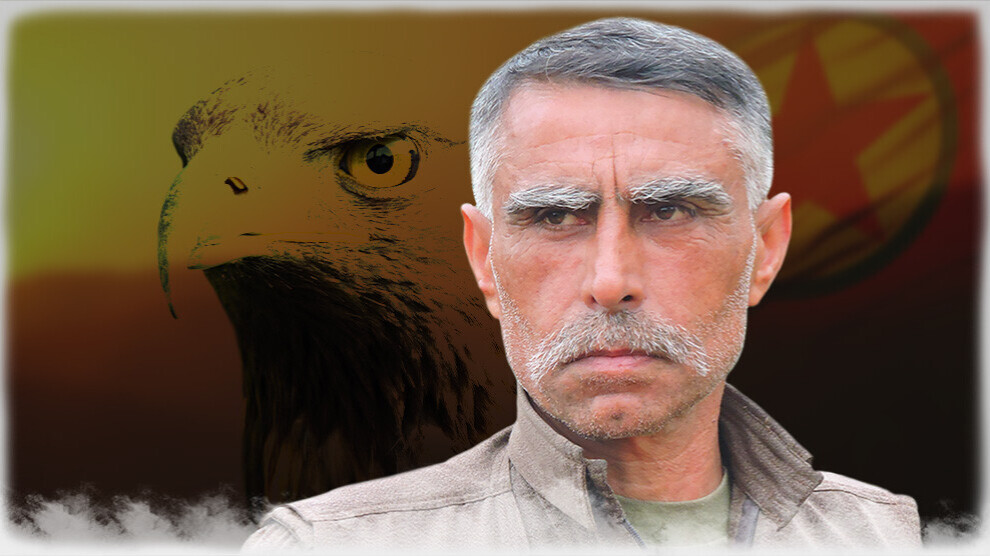HPG pays tribute to commander Orhan Cihat Bingöl
HPG commander Orhan Cihat Bingöl was killed in a Turkish attack on the Medya Defense Areas. The Kurdish revolutionary joined the PKK over 30 years ago.
HPG commander Orhan Cihat Bingöl was killed in a Turkish attack on the Medya Defense Areas. The Kurdish revolutionary joined the PKK over 30 years ago.

The People's Defense Forces (HPG) have announced the death of Orhan Cihat Bingöl. The long-time guerrilla commander, who was also a member of the HPG Command Council, was killed in an attack by the Turkish state in the Medya Defense Areas in early June. The HPG wrote that "Hevalê Orhan, who dedicated his entire life to the struggle for the freedom of our people and resisted continuously on every inch of Kurdistan for almost 33 years. He was a unique revolutionary. He fought tirelessly, with an unshakable, sincere, determined, disciplined, endless enthusiasm and passion. He loved Kurdistan and its majestic rebellious mountains, which he explored step by step and transformed into a lodge of resistance like a dervish. He was a great revolutionary commander whose only commitment was to the freedom of our people."
The statement added: "From ARGK fighter to commander of small units and entire companies in areas and regions, Hevalê Orhan worked at all levels within our guerrilla army. He achieved incredible things, trained thousands of friends with love and passed on his revolutionary experiences. He knew how to be wherever our struggle required him to be, and how to take on the revolutionary tasks of the time. In the 33 years of his revolutionary life, Comrade Orhan fought with the youthful spirit of the PKK, without hesitation and without tiring, until the day he fell a martyr."
The HPG provided the following information about Orhan Cihat Bingöl:
 Code name: Orhan Cihat Bingöl
Code name: Orhan Cihat Bingöl
First and last name: Ali Dinçer
Place of birth: Çewlîg
Mother's and father's names: Kibar - Keke
Date and place of death: 6/6/2024 / Medya Defense Areas
Orhan Cihat Bingöl was born in 1960 in Hop, a village in Xorxol (tr. Yayladere) district in Çewlîg (Bingöl) province. The region borders Dersim and is characterized by the tradition and culture of the resistance stronghold.
Orhan Cihat Bingöl grew up in a social environment that was beyond the influences and manipulations of capitalist modernity. This reality had a formative effect on his personality and the later development of his social behavior.
The statement added: "At the beginning of the 1990s, the Kurdish people had pushed the dead earth away from them with the beginning of the armed resistance on 15 August 1984 and had moved on to the revolutionary popular uprisings, the so-called Serhildan, under the motto ‘The resurrection is complete - time for liberation’. Orhan Cihat Bingöl began to take a closer look at the Kurdish movement. The great struggle for existence and freedom of the Kurdish people, which was no longer only to be found in the mountains of Kurdistan, had an impact on the whole of Turkey and also on the left-wing movements. In such an environment and process, he felt more and more sympathy for the Kurdistan freedom movement. Extensive research and intensive discussions cemented in him the idea that the liberation of Kurdistan and Turkey, the construction of real socialism and social freedom could be achieved through the PKK. Hevalê Orhan had recognized and understood the apoist ideology and broke with the existing system. He joined the apoists because he was now an apoist himself. He left his studies, marriage and children behind and joined the guerrillas because he was ready to fight for the freedom of his people and his homeland."
The statement continued: “When Orhan Cihat Bingöl joined the guerrillas in 1992 in Çewlîg, the PKK was still calling itself the Kurdistan People's Liberation Army (ARGK). As soon as he was in the mountains, he went to Behdînan, where a hot war was raging. He received a short training, and took up arms. Thousands of villages in Northern Kurdistan suffered at the hands of Turkey, which said it was "fighting the PKK", and around 17,000 people were murdered by state counter-forces. The number of people driven from their homes ran into the millions.
In 1995, Orhan Cihat Bingol went to Damascus and attended classes given by its founder, Abdullah Öcalan, at the PKK's central party school. About a year later, he returned to Northern Kurdistan as a team commander, and spent the next few years serving in the Erzîrom province. From 2000, he was back in the Medya Defense Areas. The PKK was going through turbulent times at that time, with Abdullah Öcalan being abducted from Kenya to Turkey in violation of international law, a variety of ideological and organizational attacks from within and without, and the paradigm shift that began soon afterward."
The HPG expressed its condolences to the relatives of Orhan Cihat Bingöl and the Kurdish people.